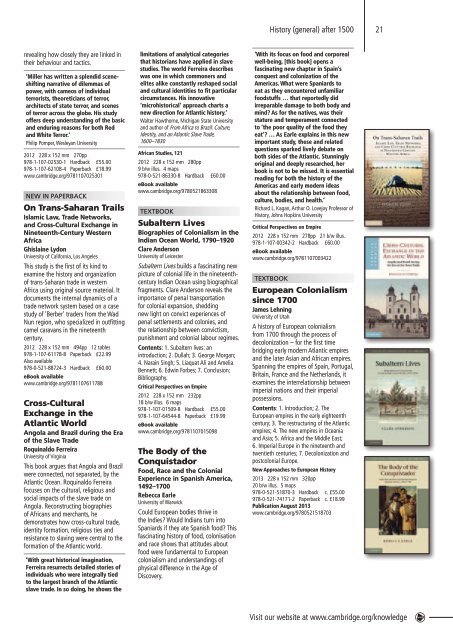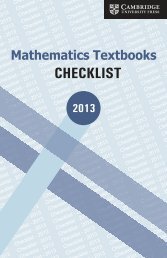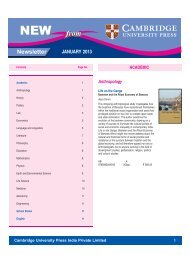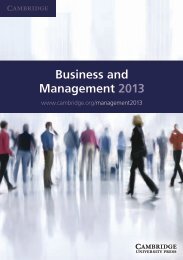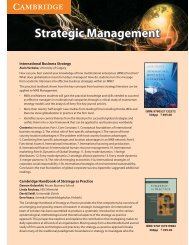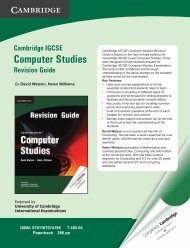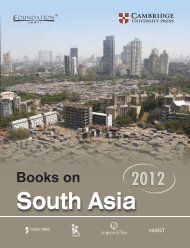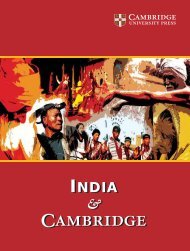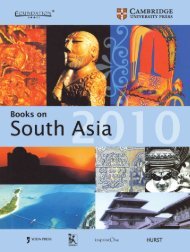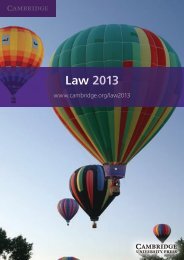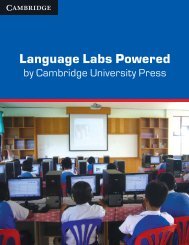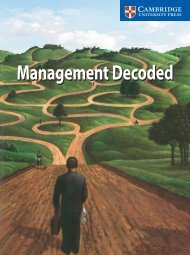History 2013 - Cambridge University Press India
History 2013 - Cambridge University Press India
History 2013 - Cambridge University Press India
You also want an ePaper? Increase the reach of your titles
YUMPU automatically turns print PDFs into web optimized ePapers that Google loves.
<strong>History</strong> (general) after 1500 21<br />
revealing how closely they are linked in<br />
their behaviour and tactics.<br />
‘Miller has written a splendid sceneshifting<br />
narrative of dilemmas of<br />
power, with cameos of individual<br />
terrorists, theoreticians of terror,<br />
architects of state terror, and scenes<br />
of terror across the globe. His study<br />
offers deep understanding of the basic<br />
and enduring reasons for both Red<br />
and White Terror.’<br />
Philip Pomper, Wesleyan <strong>University</strong><br />
2012 228 x 152 mm 270pp<br />
978-1-107-02530-1 Hardback £55.00<br />
978-1-107-62108-4 Paperback £18.99<br />
www.cambridge.org/9781107025301<br />
New in Paperback<br />
On Trans-Saharan Trails<br />
Islamic Law, Trade Networks,<br />
and Cross-Cultural Exchange in<br />
Nineteenth-Century Western<br />
Africa<br />
Ghislaine Lydon<br />
<strong>University</strong> of California, Los Angeles<br />
This study is the first of its kind to<br />
examine the history and organization<br />
of trans-Saharan trade in western<br />
Africa using original source material. It<br />
documents the internal dynamics of a<br />
trade network system based on a case<br />
study of ‘Berber’ traders from the Wad<br />
Nun region, who specialized in outfitting<br />
camel caravans in the nineteenth<br />
century.<br />
2012 228 x 152 mm 494pp 12 tables<br />
978-1-107-61178-8 Paperback £22.99<br />
Also available<br />
978-0-521-88724-3 Hardback £60.00<br />
eBook available<br />
www.cambridge.org/9781107611788<br />
Cross-Cultural<br />
Exchange in the<br />
Atlantic World<br />
Angola and Brazil during the Era<br />
of the Slave Trade<br />
Roquinaldo Ferreira<br />
<strong>University</strong> of Virginia<br />
This book argues that Angola and Brazil<br />
were connected, not separated, by the<br />
Atlantic Ocean. Roquinaldo Ferreira<br />
focuses on the cultural, religious and<br />
social impacts of the slave trade on<br />
Angola. Reconstructing biographies<br />
of Africans and merchants, he<br />
demonstrates how cross-cultural trade,<br />
identity formation, religious ties and<br />
resistance to slaving were central to the<br />
formation of the Atlantic world.<br />
‘With great historical imagination,<br />
Ferreira resurrects detailed stories of<br />
individuals who were integrally tied<br />
to the largest branch of the Atlantic<br />
slave trade. In so doing, he shows the<br />
limitations of analytical categories<br />
that historians have applied in slave<br />
studies. The world Ferreira describes<br />
was one in which commoners and<br />
elites alike constantly reshaped social<br />
and cultural identities to fit particular<br />
circumstances. His innovative<br />
‘microhistorical’ approach charts a<br />
new direction for Atlantic history.’<br />
Walter Hawthorne, Michigan State <strong>University</strong><br />
and author of From Africa to Brazil: Culture,<br />
Identity, and an Atlantic Slave Trade,<br />
1600–1830<br />
African Studies, 121<br />
2012 228 x 152 mm 280pp<br />
9 b/w illus. 4 maps<br />
978-0-521-86330-8 Hardback £60.00<br />
eBook available<br />
www.cambridge.org/9780521863308<br />
Textbook<br />
Subaltern Lives<br />
Biographies of Colonialism in the<br />
<strong>India</strong>n Ocean World, 1790–1920<br />
Clare Anderson<br />
<strong>University</strong> of Leicester<br />
Subaltern Lives builds a fascinating new<br />
picture of colonial life in the nineteenthcentury<br />
<strong>India</strong>n Ocean using biographical<br />
fragments. Clare Anderson reveals the<br />
importance of penal transportation<br />
for colonial expansion, shedding<br />
new light on convict experiences of<br />
penal settlements and colonies, and<br />
the relationship between convictism,<br />
punishment and colonial labour regimes.<br />
Contents: 1. Subaltern lives: an<br />
introduction; 2. Dullah; 3. George Morgan;<br />
4. Narain Singh; 5. Liaquat Ali and Amelia<br />
Bennett; 6. Edwin Forbes; 7. Conclusion;<br />
Bibliography.<br />
Critical Perspectives on Empire<br />
2012 228 x 152 mm 232pp<br />
18 b/w illus. 6 maps<br />
978-1-107-01509-8 Hardback £55.00<br />
978-1-107-64544-8 Paperback £19.99<br />
eBook available<br />
www.cambridge.org/9781107015098<br />
The Body of the<br />
Conquistador<br />
Food, Race and the Colonial<br />
Experience in Spanish America,<br />
1492–1700<br />
Rebecca Earle<br />
<strong>University</strong> of Warwick<br />
Could European bodies thrive in<br />
the Indies Would <strong>India</strong>ns turn into<br />
Spaniards if they ate Spanish food This<br />
fascinating history of food, colonisation<br />
and race shows that attitudes about<br />
food were fundamental to European<br />
colonialism and understandings of<br />
physical difference in the Age of<br />
Discovery.<br />
‘With its focus on food and corporeal<br />
well-being, [this book] opens a<br />
fascinating new chapter in Spain’s<br />
conquest and colonization of the<br />
Americas. What were Spaniards to<br />
eat as they encountered unfamiliar<br />
foodstuffs … that reportedly did<br />
irreparable damage to both body and<br />
mind As for the natives, was their<br />
stature and temperament connected<br />
to ‘the poor quality of the food they<br />
eat’ … As Earle explains in this new<br />
important study, these and related<br />
questions sparked lively debate on<br />
both sides of the Atlantic. Stunningly<br />
original and deeply researched, her<br />
book is not to be missed. It is essential<br />
reading for both the history of the<br />
Americas and early modern ideas<br />
about the relationship between food,<br />
culture, bodies, and health.’<br />
Richard L. Kagan, Arthur O. Lovejoy Professor of<br />
<strong>History</strong>, Johns Hopkins <strong>University</strong><br />
Critical Perspectives on Empire<br />
2012 228 x 152 mm 278pp 21 b/w illus.<br />
978-1-107-00342-2 Hardback £60.00<br />
eBook available<br />
www.cambridge.org/9781107003422<br />
Textbook<br />
European Colonialism<br />
since 1700<br />
James Lehning<br />
<strong>University</strong> of Utah<br />
A history of European colonialism<br />
from 1700 through the process of<br />
decolonization – for the first time<br />
bridging early modern Atlantic empires<br />
and the later Asian and African empires.<br />
Spanning the empires of Spain, Portugal,<br />
Britain, France and the Netherlands, it<br />
examines the interrelationship between<br />
imperial nations and their imperial<br />
possessions.<br />
Contents: 1. Introduction; 2. The<br />
European empires in the early eighteenth<br />
century; 3. The restructuring of the Atlantic<br />
empires; 4. The new empires in Oceania<br />
and Asia; 5. Africa and the Middle East;<br />
6. Imperial Europe in the nineteenth and<br />
twentieth centuries; 7. Decolonization and<br />
postcolonial Europe.<br />
New Approaches to European <strong>History</strong><br />
<strong>2013</strong> 228 x 152 mm 320pp<br />
20 b/w illus. 5 maps<br />
978-0-521-51870-3 Hardback c. £55.00<br />
978-0-521-74171-2 Paperback c. £18.99<br />
Publication August <strong>2013</strong><br />
www.cambridge.org/9780521518703<br />
Visit our website at www.cambridge.org/knowledge


